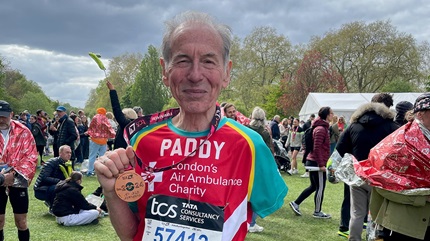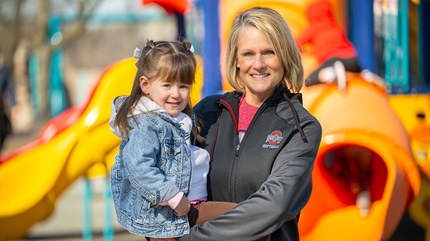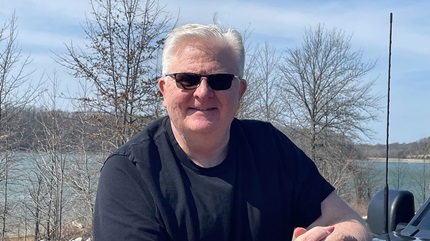
When 74-year-old Paddy Pugh started experiencing pain and numbness in his right hand, he did what many people do – he googled his symptoms. Since losing his left arm and hand in a road accident in 2010, the prospect of losing function in his remaining hand was nothing short of terrifying.
“I was worried about losing my independence and quality of life,” he says.
His symptoms pointed to carpal tunnel syndrome, but Paddy didn’t have the typical risk factors that many people do. Carpal tunnel syndrome is a health condition that causes pain, numbness, tingling and weakness in the hand and wrist. It’s often seen in people who use power tools or work a lot on a computer keyboard – neither of which Paddy did.
“I assumed mine was linked to overuse since it’s the only hand I’ve got,” he says.
As his pain continued to escalate, basic tasks became excruciating.
“I was only sleeping about two hours a night,” he says. “Medication was offering little to no relief.”
In his search for help, Paddy turned to the internet again, this time to look for a specialist who could offer a solution to his worsening condition. That's when he found Ms. Mary Murphy, a consultant neurosurgeon at Cleveland Clinic London.
“I don’t have private health insurance, but I was willing to pay to get this dealt with quickly,” says Paddy.
When Ms. Murphy first saw Paddy in November 2023, she knew time was of the essence.
“I was struck by how critically important it was for him to sort his problem out as swiftly and effectively as possible because he is so dependent on his right arm,” she says. “I thought the most likely diagnosis was carpal tunnel syndrome, so I arranged electrical studies of his arm which confirmed that.”
Despite attempts with a wrist splint and medication, Paddy’s symptoms persisted.
“We discussed surgery as the best option because of the severity of his symptoms, the need for a lasting solution and the absolute need to avoid any permanent disability,” says Ms. Murphy.
Carpal tunnel decompression surgery involves a cut through the skin crossing the wrist and then dividing the thick band, called the flexor retinaculum, which is responsible for trapping the median nerve. Once the band has been cut, more room for the nerve is instantly created. The rest of the operation involves ensuring the band is completely divided all the way along its length and stopping any bleeding.
With the holidays fast approaching, Ms. Murphy gave Paddy the option of having surgery before or after Christmas.
“Knowing that Paddy relied on that arm made me very vigilant that we were progressing his care as expeditiously as possible,” says Ms. Murphy.
As an early Christmas present to himself, Paddy had surgery on 18 December at Cleveland Clinic London.
“I wasn’t nervous because I knew it was under local anesthetic and would only take about 20 minutes,” he says. “I just wanted it sorted. I was relieved it could be done that quickly.
“The facility is everything you would want,” he adds. “There were plenty of staff. I was seen within minutes of signing in. It was spacious and had the latest equipment.”
Following surgery, Paddy was pleasantly surprised his hand was bandaged below his fingers, so he was able to feed himself and do other basic tasks.
“I only needed help for about two weeks with bathing because I couldn’t get my hand wet while it was bandaged,” he says.
Two months later, Paddy returned for a follow-up. His symptoms had resolved, and the wound had healed without complications. Ms. Murphy's expertise and meticulous approach had not only resolved Paddy's immediate suffering but also ensured a promising prognosis for his future.
“The whole process from start to finish took only a matter of weeks,” he says.
Paddy's story underscores the importance of personalised care and access to timely treatment, especially for individuals with unique medical needs. In sharing his experience, he hopes to inspire others facing similar challenges to advocate for their health and explore all available avenues for relief.
"It can be difficult to judge when a symptom or problem is about to become a permanent problem,” says Ms. Murphy. “I think Paddy was very smart to seek prompt care in these circumstances. His condition has been treated, his discomfort and pain are gone and the whole process was very efficient.”
In fact, Paddy’s recovery was so swift that he was able to participate in the London Marathon just a few months later, completing the race in a remarkable 4 hours and 5 seconds proving that with the right treatment, anything is possible.
Patient Stories
Man’s Carpal Tunnel Journey Highlights the Importance of Timely Treatment
Apr 29, 2024
"I was worried about losing my independence and quality of life - but the whole process from start to finish took only a matter of weeks."


